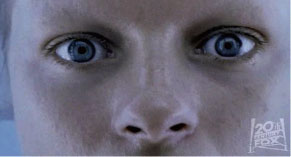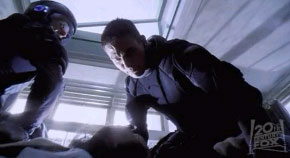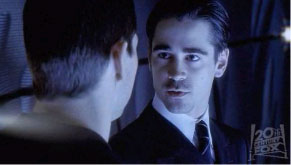
MINORITY REPORT
April 14th, 2004
(Dated: May 14, 2001) - by Scott Frank
Reviewed by Christopher Wehner
(5/31/02)
NOTE: This is a SPOILER FREE review of a shooting script. No major plot twists are discussed, nor is the ending.
On the surface screenwriter Scott Frank (GET SHORTY, OUT OF SIGHT, LITTLE MAN TATE) would appear to be utterly the wrong guy to write a Sci-fi movie. By his own admission he's a "character" screenwriter. What I mean is, he doesn't start with a premise, or a cool idea, he starts his thinking process with interesting and unique characters and builds a narrative from there. His scripts are always character-driven. That's not usually how Sci-fi movies are born. They usually start with some new idea or concept about the future, and go from there. The characters in Sci-fi movies usually are only there to service the concept, and the ideas that make up the Sci-fi landscape. I'm generalizing here and I admit that. GATTACA, written and directed by Andrew Niccol, comes to mind. An intelligent, sophisticated, and entertaining Sci-fi story, but most importantly one that explored the nature of the human spirit. It was about the characters every bit as much as it was about the grand concept of the story. It was an entertaining movie because it was working on more than one levelwhich helps to elevate the drama.
Do you remember when movies like DOG DAY AFTERNOON, THE CONVERSATION, and THE FRENCH CONNECTION were actually made for intelligent and complex adults who didn't mind a little thought process while their buts were planted in movie theater seats and they stuffed popcorn into their pie holes?
The MINORITY REPORT script, and the subsequent movie, will inject a little life into what I think has been a tired genre of late. Scott Frank's script, with some help from Jon Cohen's November 24, 1997 draft, has reinvigorated science fiction storytelling with a fresh perspective. The script tipped the scales at 153 pages. When I first looked at it I thought it was a manuscript. An interesting idea is indeed a part of this story (the ability to see into the future and stop a murder before it occurs), but it is a narrative that is driven by its characters, more specifically by the needs of its important characters. It stands up on its own two-legs without the help of its "high concept."

In recent years we've seen a plethora of "cool" Sci-fi movies with the "bitch-in'" special effects. We get great ideas, but poor story execution, and one-dimensional characters. We get, "attitudes" and not "characters." We get singular adjectives.
I know I'm leaving out an entire wasteland of pulverized Sci-fi stories masquerading as cinema. Do I like to see cool special effects? Of course, I do, but I like a good story with my action and special effects. And relax, as weve already heard, there are some 400 special effects shots in MINORITY REPORT. So you special effects junkies will get your fix.
Scott Frank's MINORITY REPORT script has a lot going for it. It's an intelligent and sophisticated Sci-fi story with complex characters, and more specifically a main character (John Anderton) that doesn't fit into the usual mold.

The story opens with a woman's voice as she whispers, "Murderer," and with it is set in motion the inevitable. Later a man is arrested before he ever commits the crime, but not before an exciting and riveting sequence that will have you on the edge of your seat. (The shot from the trailer with the four guys dropping in from the ceiling appears to be from this opening sequence.)
John Anderton (Tom Cruise) is the senior detective of Precrime in Washington, D.C., where no one has committed a murder in six years. Andertons title is kind of an irony as there's really not much detective work for him, hence the name Pre-crime. Anderton and his crew are in the chase and catch business now. There are some imaginative chase sequences in the script. I was surprised by how strong these actions scenes were. It should be cool. There I said it, its going to be a cool movie.
There are three prescient beings (Precogs) who can see into the future and determine a future murder before the crime is committed. There are two males and one female. The only one worth mentioning is Agatha, who is described as the truly "gifted" Precog. She's the dominate one. The Precogs are kept in tanks filled with a milky white substance and their visions of murder recorded on computers that spit out a small "Red Ball" with the name of the future murderer on it. In this futuristic society they give a whole new meaning to a lottery drawing. The Precogs are human, but they're not treated as such. Anderton tells us it's easier to look at the Precogs if you don't consider them "human." They are kept in a drug-induced state. Sometimes they writhe about in paina horrible existence.

Danny Witwer (Colin Farrell) arrives early on in the script to assess and observe Precrime. But what he is really doing there is searching for a "flaw." We learn he believes in the system, but not necessarily its caretakers. Witwer starts snooping around. Right away, you don't trust this guy. The character interactions between Anderton and Witwer are actually set up nicely by the trailers.
What caught me off guard in the script was the character development of John Anderton. No, it's nothing revolutionary, but just, unexpected. When Anderton goes home at night we realize the guy has got issues. He's, well a drug addict. This isn't the typical trait for your typical movie hero. Flawed characters tend to be more interesting. But having a seriously flawed main character is risky.
Getting the audience to feel any kind of sympathy for a drug addict can be hard. Obviously it's Tom Cruise, and that's sympathy enough. But the screenwriter doesn't take the easy way out. As we watch Anderton back in his apartment, completely high, he turns on a computer that projects laser holographic images of his dead son, and then he proceeds to talk to him. Heartbreaking scenes that do not come across as contrived in any way. This sequence is setup very nicely by Frank. At one point, Anderton reaches out for his son, and it is then we realize the true depths of his pain. Even as he slides down to the floor and takes another hit from the inhalant drug, we're instantly forming a bond with this character. We want this guy to find some happiness, and to be at peace with himself.
I want to be careful, so I won't go into too many details. But since one of the production stills on the Web shows Anderton holding Agatha (the female Precog played by Samantha Morton) as does the trailer, I feel I can mention something here. Early on in the script you get the feeling that Agatha and Anderton have a bond, though at first Anderton doesn't realize it. Agatha represents a "reflection" of Anderton's character. She is also emotionally isolated, trapped, and unable to truly communicate her feelings. She's a prisoner. In an early scene in the script Agatha seems to be reaching out to Anderton, and when he gets close to her she whispers "can you see?" But, he can't see, at least not like her. He can't even see his true self, and he certainly can't see what's really going on. It's an interesting storyline that you should pay attention to in the movie.
About 50 minutes into the script (this has to happen faster in the movie) destiny finally catches up to John Anderton. Remember, as a general rule, one page usually equals one minute of screen time. Of course, a screenwriter can say, "fight sequence here" which could take minutes of screen time.
"Case #1109, previsualized by the Precogs and recorded on holosphere by Precrime's q-stacks" And there on Anderton's computer screen is his own image. He's a future murderer.
"Jesus, okay very funny." But it's no joke. Anderton's world is turned upside down and he is on the run. Now he has to become a detective again, like he once was, in order to save himself. This is also when the already heavily advertised "Everybody runs" line comes in, which could be another "I'll be back." (Note: the line "Everbody runs" first appears in Jon Cohen's draft. He uses it a little differently, but the idea is the same.)
The script changes in tone several times. As it revealed itself, layer-by-layer, from a pure Sci-fi actioneer, to a fugitive man-on-the-run thriller, and all the while a mystery is building. The development of the mystery contains elements that are very Hitchcockian. There's also a kind of Film Noir feel to the script as well. It's subtle, but it's there on the pages and hopefully that comes through on the screen. We're presented with a fairly dark hero, albeit a sympathetic one, and a mystery where no one can be trusted. Most impressively, the script gracefully handles these shifts in tone without losing the narrative trajectory of the story.
The story will surprise you. It has a couple of plot twists that will entertain. Just when I thought I knew what was coming next, I got something completely different.
A final note on the character development of MINORITY REPORT: it actually occurs. There's something that screenwriters call a character arc. John Anderton's arc is very recognizable as he reevaluates himself and the world around him. Also, character touches are important. Every character in MINORITY REPORT has a personal trait, mannerism, or point of view that distinguishes them from the others. Some are actually fairly humorous. Some are complex and some are blatantly simple, but never boring.
It's going to be interesting to see what Spielberg did with the script. From what I've heard the movie will be everything I hope it will be. Spielbergs AI was a failure, but a rather brilliant one. Hes not going to make any mistakes with this script. This is going to be a great movie.
So if there are any doubts about this one please refer to the equation below:
Spielberg + Cruise + Good Script = Box Office hit
Look for MINORITY REPORT at a theater near you on June 21, 2002. I look forward to it.
Until next time.
-- ChrisMore recent articles in Script Reviews
Only logged-in members can comment. You can log in or join today for free!
Advertisement






